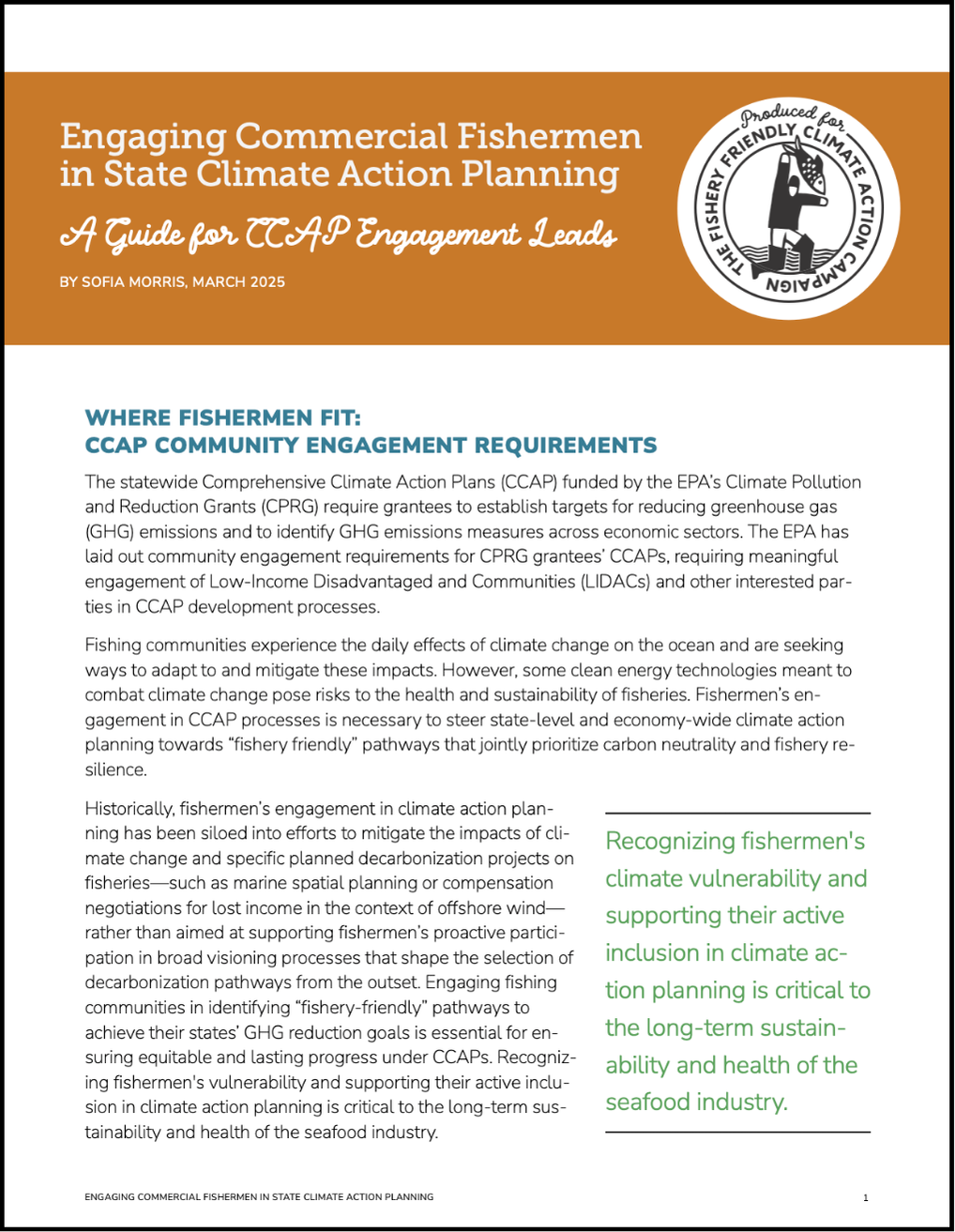
State CPRG Resource Center
Learn and take action
RESOURCES FOR > Fishermen State Planners
Forty-six states are developing Comprehensive Climate Action Plans (CCAPs) in 2024-2025 as a result of the Environmental Protection Agency’s Climate Pollution Reduction Grants (CPRG) program, with another 173 CCAPS simultaneously led by tribes and metropolitan areas.
These plans will set in motion several decades of climate policy and investment, and they represent a critical moment to shape decarbonization pathways. The resources on this page synthesize timely information and targeted opportunities to help fishermen center fishery friendly climate action in their state CCAP processes.
Resources for Fishermen
The Fishery Friendly Climate Action Campaign is available to support state-based and local groups of fishermen make the most of their opportunity to engage in state-level CCAP processes by:
Tracking state-level CCAP processes and providing you with cues, tips, and tricks on when and how to engage in these processes for the most meaningful and efficient impact;
Being a thought partner for you as you strategize on how your own group will engage in these processes;
If desired, liaise on your behalf with state-level CCAP planning bodies to convey your priorities and/or obtain more information to help you engage;
Share knowledge and best practices gleaned from fishermen’s participation in other state-level CCAP processes with you and help you integrate these lessons into your own CCAP strategy; and
If there is sufficient interest from multiple states, we will convene an interstate community of practice to support collaborative learning and strategizing across the fishing industry.
State CCAP Fact Sheets
Watch >
Take Action >
Fishermen are already taking action…
In September 2024, Massachusetts fishermen and fisheries associations asked the Massachusetts Office of Climate Innovation and Resilience to:
Meaningfully engage with the Massachusetts fishing and seafood community in the context of the CCAP, using the same climate justice-informed values that they would use when engaging with any other frontline and fenceline community in Massachusetts.
Consider impacts to ocean ecosystems, fishing activities, and fishing dependent communities within their analysis of co-benefits and disbenefits associated with GHG reduction measures considered in the CCAP, and use this analysis to prioritize the plan’s reliance on measures that are “fishery friendly.”
… and you can take action too!
Members of the fishing industry and their representatives are invited to contact Sarah Schumann for tips on promoting fishery friendly climate action within your own state’s CCAP process.
Resources for State Climate Planners
The Fishery Friendly Climate Action Campaign is available to support state climate planners by:
Connecting you with local fisheries organizations and spokespeople in your state who can provide input on your CCAP process; and
Sharing knowledge and best practices gleaned from fishermen’s participation in other state-level CCAP processes with you and help you integrate these lessons into your own CCAP strategy.
The fishing community: A priority partner in climate action planning
Climate action planning is a complex, multi-disciplinary exercise. When done right, it assesses tradeoffs and synergies, balances numerous competing societal priorities, and delivers analytically rigorous decarbonization pathways for careful consideration—and ultimately, selection—by the public and policy makers. The best outcomes result from transparent dialogue, inclusive process design, and participatory analysis of alternative pathways.
The fishing community is a priority community for engagement in climate action planning because our wellbeing and our ability to continue providing seafood for the American public are directly affected both by climate change itself and by a number of the solutions proposed to combat the climate crisis. Coastal states must make a deliberate effort to include the fishing community in CCAP processes.
The Fishery Friendly Climate Action Campaign is here to help. Please contact Sarah Schumann if you would like assistance engaging the fishing community in your state.












